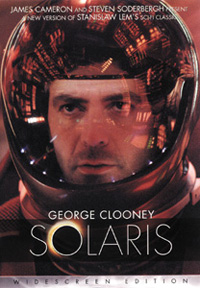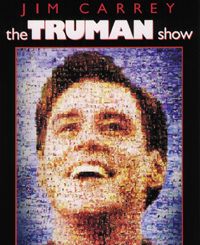 Solaris
Solaris
with George Clooney, Natascha McElhone, Ulrich Tukur
Directed by Steven Soderbergh
Written by Stanislaw Lem, Steven Soderbergh
(20th Century Fox)
by Chad Van Wagner
Steven Soderbergh is becoming the master of the remake. Between Traffic, Oceans Eleven (soon to be followed with the sequel, Oceans Twelve), and now Solaris, he’s managed to make worthwhile films out of what is becoming the bane of Hollywood (the ’80s Patrick Dempsey vehicle, Can’t Buy Me Love, is inexplicably on the slate for a remake. God help us).
But then, it’s a bit unfair to classify Solaris as a remake. True, master Russian filmmaker Andrei Tarkovsky made perhaps his best-known film under this title, and Soderbergh’s effort looks quite a bit like it visually. But, just as Tarkovsky bent Stanislaw Lem’s existential novel to fit his own obsessions, Soderbergh rearranges the building blocks to create something quite different from both the book and its previous celluloid counterpart.
This Solaris is a love story, although studio 20th Century Fox certainly blew it by promoting it as such. Rather than some vapid “chick flick” ala the God-awful How to Lose a Guy in 10 Days, this is a love story concerned about humanity and mistakes, and although the couple in question does ride off into the sunset together (perhaps literally), that isn’t the point. The very human (but ultimately destructive) desire to go back and correct that which cannot be corrected… that is the point.
George Clooney plays Chris Kelvin, a psychologist who must visit a remote space station where the crew has seemingly gone off the deep end. Upon arriving, he meets the bizarre Dr. Snow (a goofy and strangely endearing Jeremy Davies), whose odd mannerisms and elliptical speech create more questions than they answer. Things go downhill into the completely unreal, as Kelvin wakes to find himself next to his dead wife (Natascha McElhone). What’s going on here?
You never find out, not exactly, but that’s the idea. This is a film about people, not outer space weirdness, and it’s a very good one. Unfortunately, the studio had no clue how to promote it, and it was alternately sold as an outer space film (mega director James Cameron produced), a romance (as the included “making of” specials try to sell it as), and as a chance to ogle Clooney’s naked butt (twice). While it does have all these things, Solaris is really about asking the audience questions, and the journey is infinitely more important than whatever answer the viewer might come up with. A diamond in the rough.
(www.solarisdvd.com)



